30-Day Study Plan for Geography Class 11 | Geography Class 11 - Humanities/Arts PDF Download
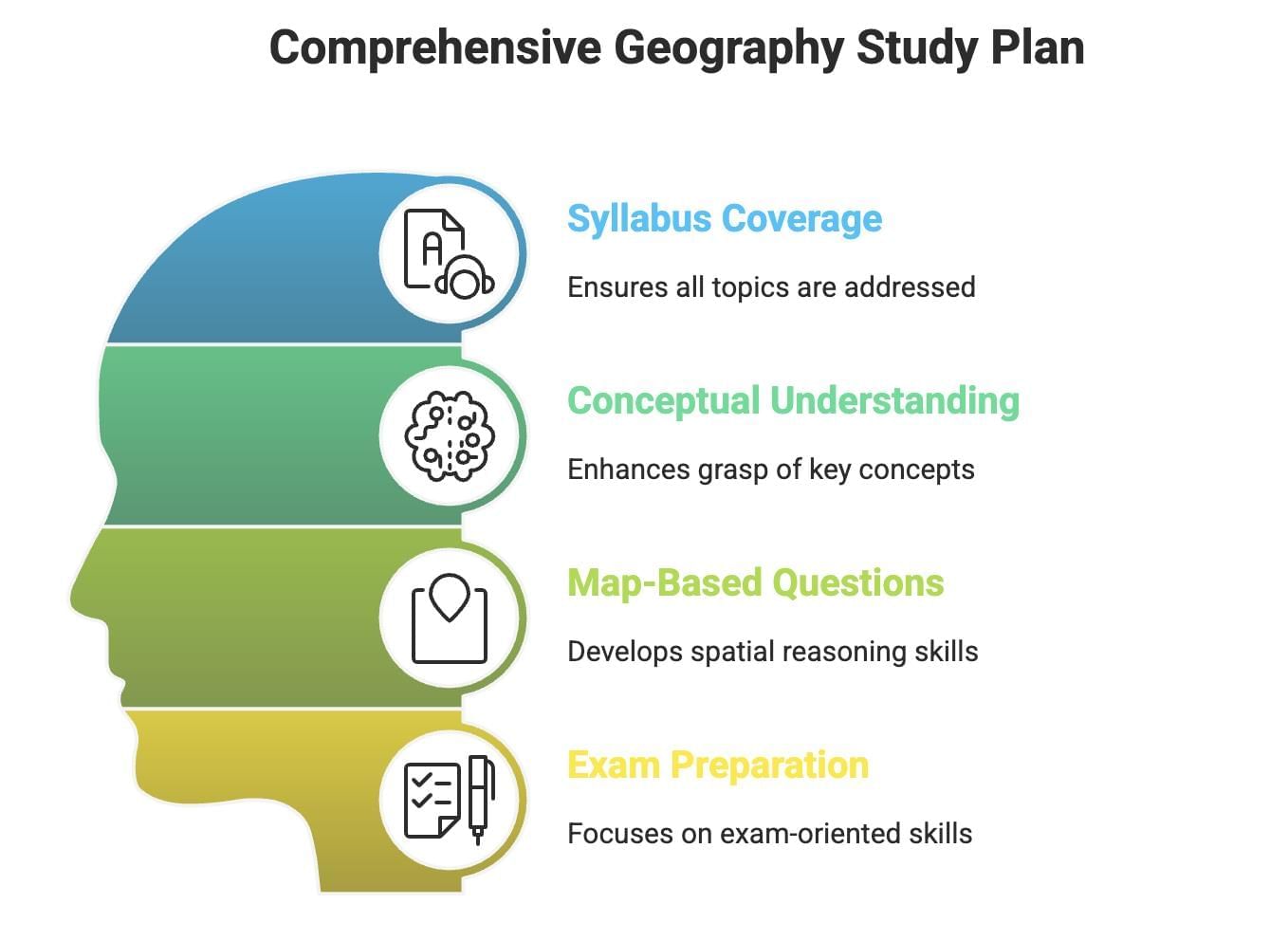
Week 1: Fundamentals of Physical Geography - Basics
Day 1: Geography as a Discipline
Understand geography’s scope, branches, and interdisciplinary nature.
- Read: NCERT Textbook - Geography as a Discipline
- Study: Revision Notes: Geography as a Discipline and Mind Map: Geography as a Discipline
- Practice: Test: Geography As A Discipline
Day 2: The Origin and Evolution of the Earth
Explore theories like the Nebular Hypothesis and the formation of planets.
- Read: NCERT Textbook - The Origin and Evolution of the Earth
- Study: Revision Notes: The Origin and Evolution of the Earth and Origin of the Earth: Nebular Hypothesis Theory
- Practice: Test: The Origin And Evolution Of The Earth
Day 3: Interior of the Earth
Learn about Earth’s internal structure, earthquakes, and volcanoes.
- Read: NCERT Textbook - Interior of the Earth
- Study: Revision Notes - Interior of the Earth and Earthquake: Causes and Types of Waves
- Practice: Test: Interior Of The Earth - 1
Day 4: Distribution of Oceans and Continents
Study continental drift, plate tectonics, and ocean floor features.
- Read: NCERT Textbook - Distribution of Oceans and Continents
- Study: Revision Notes - Distribution of Oceans and Continents and Continental Drift
- Practice: Test: Distribution Of Oceans & Continents - 1
Day 5: Geomorphic Processes
Understand weathering, diastrophism, and other geomorphic processes.
- Read: NCERT Textbook - Geomorphic Processes
- Study: Revision Notes: Geomorphic Processes - 1 and What is Weathering?
- Practice: Test: Geomorphic Processes - 1
Day 6: Landforms and their Evolution
Explore the formation and evolution of various landforms.
- Read: NCERT Textbook - Landforms and their Evolution
- Study: Revision Notes: Landforms & their Evolution - 1 and Mind Map: Landforms & their Evolution
- Practice: Test: Landforms And Their Evolution
Day 7: Revision and Map-Based Questions
Revise Chapters 1-4 and practice map-based questions.
- Revise: Flashcards: Geography as a Discipline and Flashcards: The Origin and Evolution of the Earth
- Practice: Map Based Questions: Distribution of Oceans and Continents
- Practice: Passage Based Questions: Geography as a Discipline
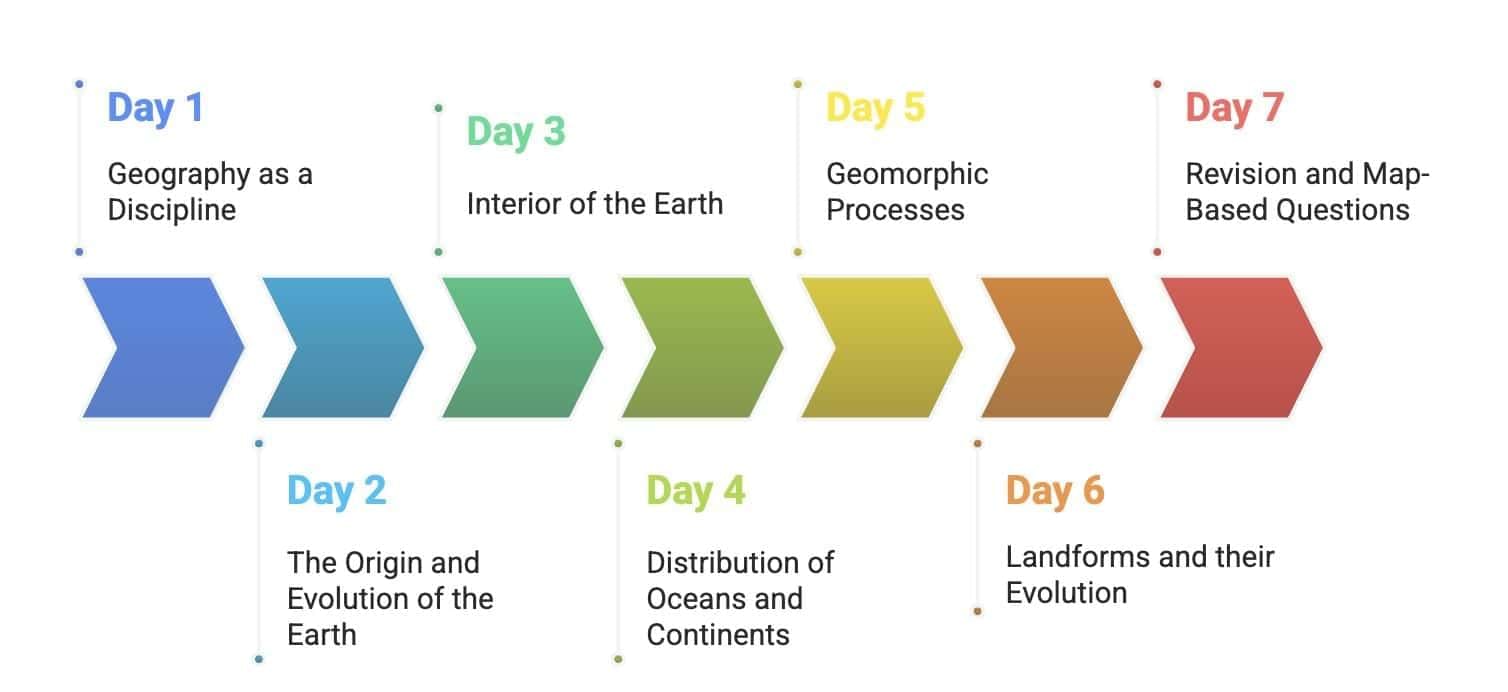
Week 2: Fundamentals of Physical Geography - Advanced Topics
Day 8: Composition and Structure of Atmosphere
Learn about atmospheric layers and composition.
- Read: NCERT Textbook - Composition and Structure of Atmosphere
- Study: Revision Notes - Composition and Structure of Atmosphere and The Layers of Atmosphere
- Practice: Test: Composition & Structure Of Atmosphere - 1
Day 9: Solar Radiation, Heat Balance and Temperature
Study solar radiation, heat transfer, and temperature distribution.
- Read: NCERT Textbook - Solar Radiation, Heat Balance and Temperature
- Study: Revision Notes - Solar Radiation, Heat Balance and Temperature and Solar Radiations
- Practice: Test: Solar Radiation, Heat Balance & Temperature - 1
Day 10: Atmospheric Circulation and Weather Systems
Understand atmospheric pressure, wind systems, and weather patterns.
- Read: NCERT Textbook - Atmospheric Circulation and Weather Systems
- Study: Revision Notes: Atmospheric Circulation & Weather Systems - 1 and Forces Affecting the Velocity and Direction of Wind
- Practice: Test: Atmospheric Circulation & Weather Systems - 1
Day 11: Water in the Atmosphere
Explore the hydrological cycle, condensation, and types of rainfall.
- Read: NCERT Textbook - Water in the Atmosphere
- Study: Revision Notes - Water in the Atmosphere and Types of Rainfall
- Practice: Test: Water In The Atmosphere - 1
Day 12: World Climate and Climate Change
Study global climate zones and causes of climate change.
- Read: NCERT Textbook - World Climate and Climate Change
- Study: Revision Notes: World Climate & Climate Change - 1 and Tropical Humid Climate
- Practice: Test: World Climate And Climate Change
Day 13: Revision and Case-Based Questions
Revise Chapters 5-9 and practice case-based questions.
- Revise: Flashcards: Composition and Structure of Atmosphere and Flashcards: Solar Radiation, Heat Balance and Temperature
- Practice: Test: World Climate and Climate Change- Case Based Type Questions
- Practice: Important Questions: Composition & Structure of Atmosphere
Day 14: Past Year Questions
Solve previous year questions to understand exam patterns.
- Practice: Class 11 Geography Previous Year Paper - 1
- Practice: CBSE Sample Question Paper (2023-24) - 1
- Practice: Short Question Answers: Geography as a Discipline
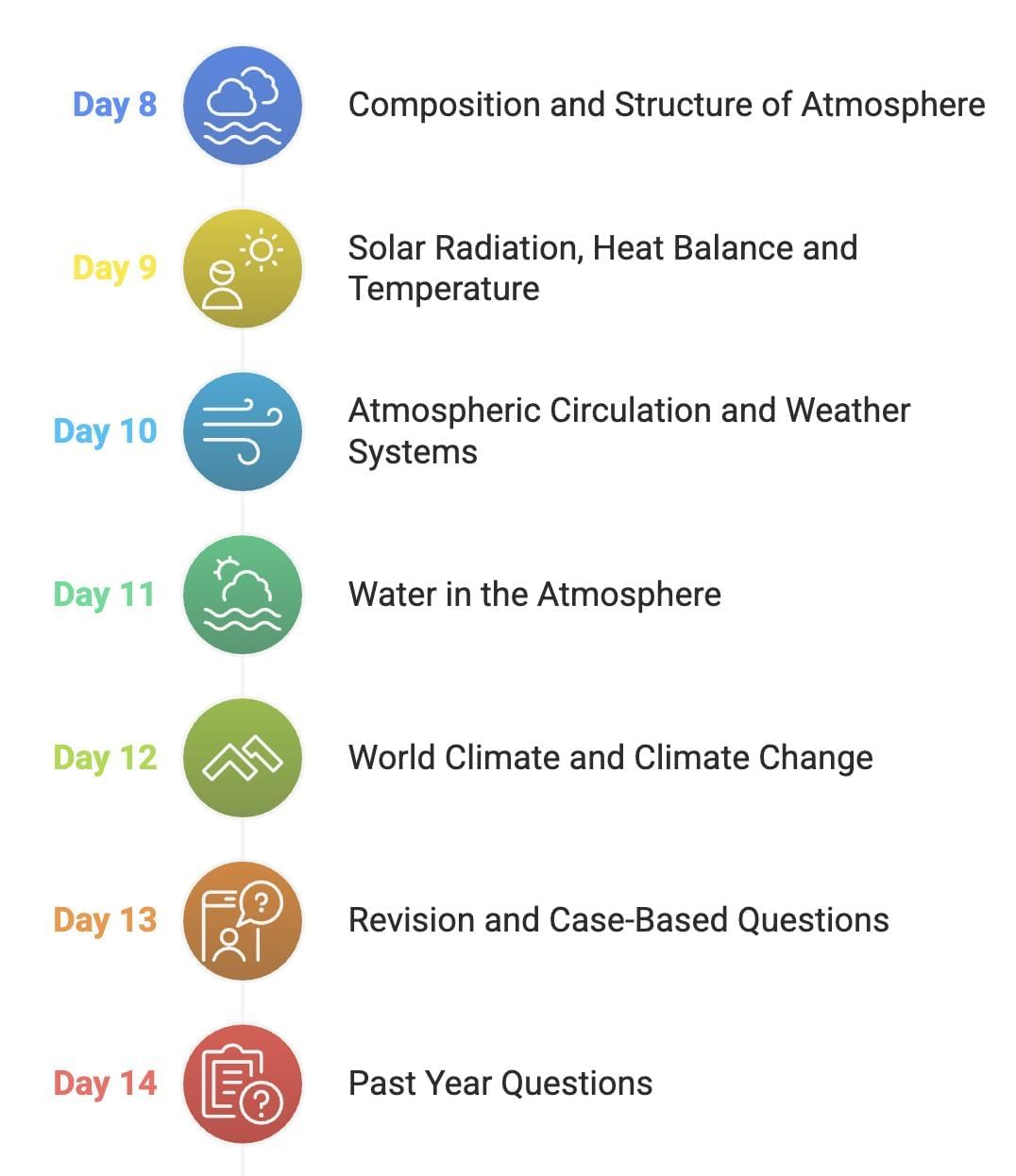
Week 3: Indian Physical Environment and Additional Topics
Day 15: India - Location
Study India’s geographical location and its neighbours.
- Read: NCERT Textbook: India - Location
- Study: Revision Notes - India — Location and India and Its Neighbours
- Practice: Test: India - Location - 1
Day 16: Structure and Physiography
Learn about India’s physical features, including the Himalayas and plateaus.
- Read: NCERT Textbook - Structure and Physiology
- Study: Revision Notes: Structure & Physiography and The Himalayan Mountains
- Practice: Test: Structure and Physiography
Day 17: Drainage System
Explore India’s river systems and drainage patterns.
- Read: NCERT Textbook - Drainage System
- Study: Revision Notes - Drainage System and Drainage System of India
- Practice: Test: Drainage System - 1
Day 18: Climate
Study India’s climate and seasonal variations.
- Read: NCERT Textbook - Climate
- Study: Revision Notes: Climate - 1 and The Seasons of India
- Practice: Test: Climate
Day 19: Natural Vegetation
Learn about India’s vegetation types and their distribution.
- Read: NCERT Textbook - Natural Vegetation
- Study: Revision Notes - Natural Vegetation and Natural Vegetation
- Practice: Test: Natural Vegetation
Day 20: Natural Hazards and Disasters
Understand types of natural hazards and their management.
- Read: NCERT Textbook - Natural Hazards and Disasters
- Study: Revision Notes - Natural Hazards and Disasters and Natural Hazards and Disasters
- Practice: Test: Natural Hazards & Disasters - 1
Day 21: Map-Based Questions and Worksheets
Practice map-based questions and worksheets for Indian Physical Environment.
- Practice: Map Based Questions: Climate and Map Based Questions: Natural Vegetation
- Practice: Worksheet: Drainage System and Worksheet Solutions: Drainage System
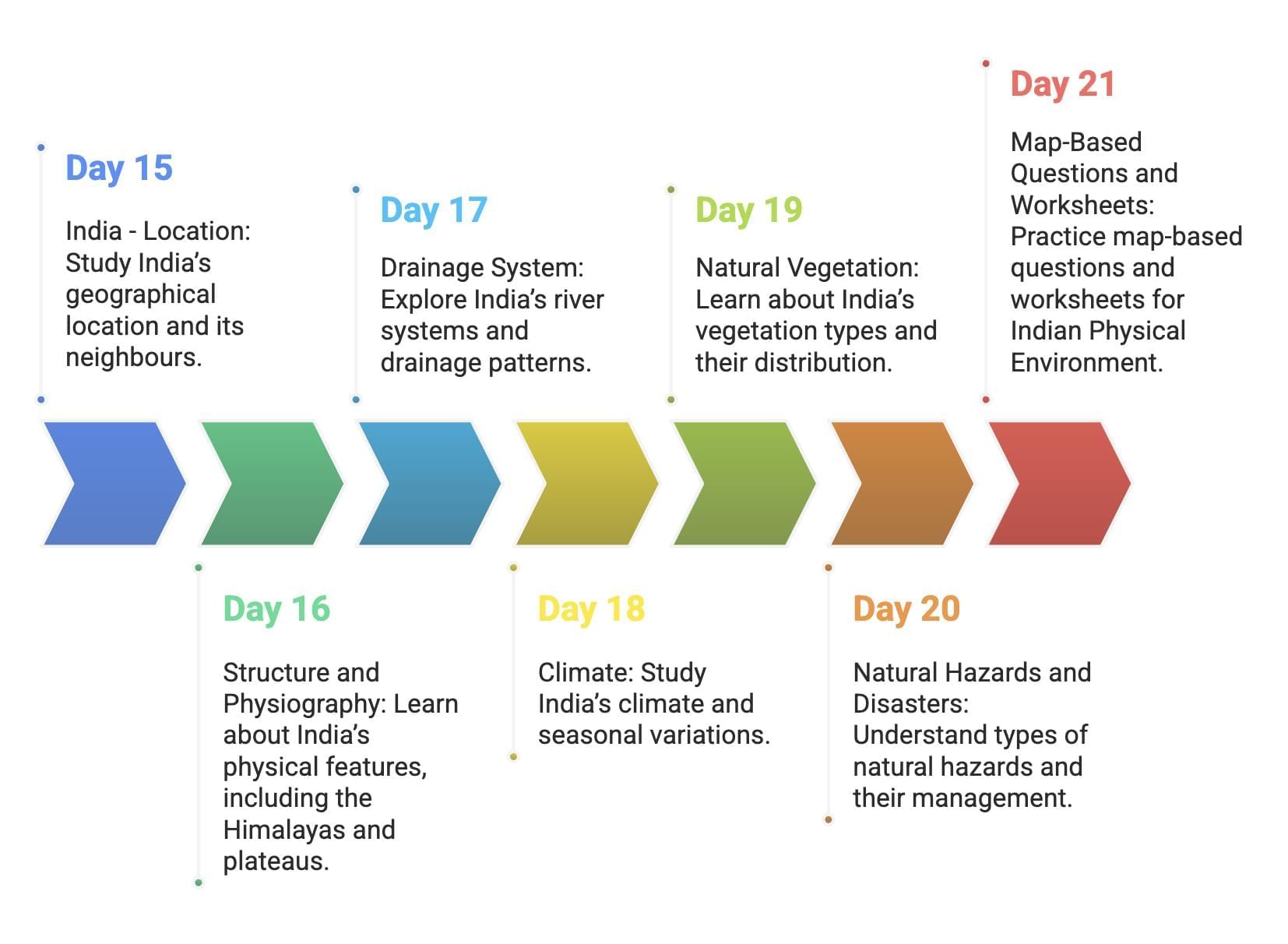
Week 4: Comprehensive Revision and Exam Preparation
Day 22: Revision - Fundamentals of Physical Geography (Part 1)
Revise Geography as a Discipline, The Origin and Evolution of the Earth, and Interior of the Earth.
- Revise: Mind Map: Geography as a Discipline and Mind Map: The Origin & Evolution of the Earth
- Practice: Passage Based Questions: Geography as a Discipline
Day 23: Revision - Fundamentals of Physical Geography (Part 2)
Revise Distribution of Oceans and Continents, Geomorphic Processes, and Landforms.
- Revise: Mind Map: Geomorphic Processes and Mind Map: Landforms & their Evolution
- Practice: Test: Landforms and their Evolution - Case Based Type Questions
Day 24: Revision - Atmospheric and Oceanic Systems
Revise Composition and Structure of Atmosphere, Solar Radiation, and Water in the Atmosphere.
- Revise: Mind Map: Solar Radiation, Heat Balance and Temperature and Mind Map: Water in the Atmosphere
- Practice: Important Questions: Solar Radiation, Heat Balance & Temperature
Day 25: Revision - Indian Physical Environment (Part 1)
Revise India - Location, Structure and Physiography, and Drainage System.
- Revise: Mind Map: India Location and Mind Map: Structure & Physiography
- Practice: Passage Based Questions: Drainage System
Day 26: Revision - Indian Physical Environment (Part 2)
Revise Climate, Natural Vegetation, and Natural Hazards and Disasters.
- Revise: Mind Map: Natural Vegetation and Mind Map: Natural Hazards & Disasters
- Practice: Test: Natural Vegetation- Case Based Type Questions
Day 27: Map-Based Work
Focus on map-based questions across all topics.
- Practice: Map Based Questions: Structure and Physiography and Map Based Questions: Natural Hazards and Disasters
- Practice: Drainage System
Day 28: Previous Year Papers
Solve previous year papers to simulate exam conditions.
- Practice: Class 11 Geography Previous Year Paper - 2
- Practice: CBSE Sample Question Paper (2023-24) - 2
Day 29: Mock Test and Worksheet Practice
Take a full-length mock test and solve worksheets.
- Practice: Class 11 Geography Previous Year Paper - 3
- Practice: Worksheet: Structure and Physiography and Worksheet Solutions: Structure and Physiography
Day 30: Final Revision and Doubt Clearing
Revise weak areas and clarify doubts using NCERT solutions and flashcards.
- Revise: NCERT Solutions - Biodiversity and Conservation and Flashcards: Biodiversity and Conservation
- Practice: Important Questions: India: Location
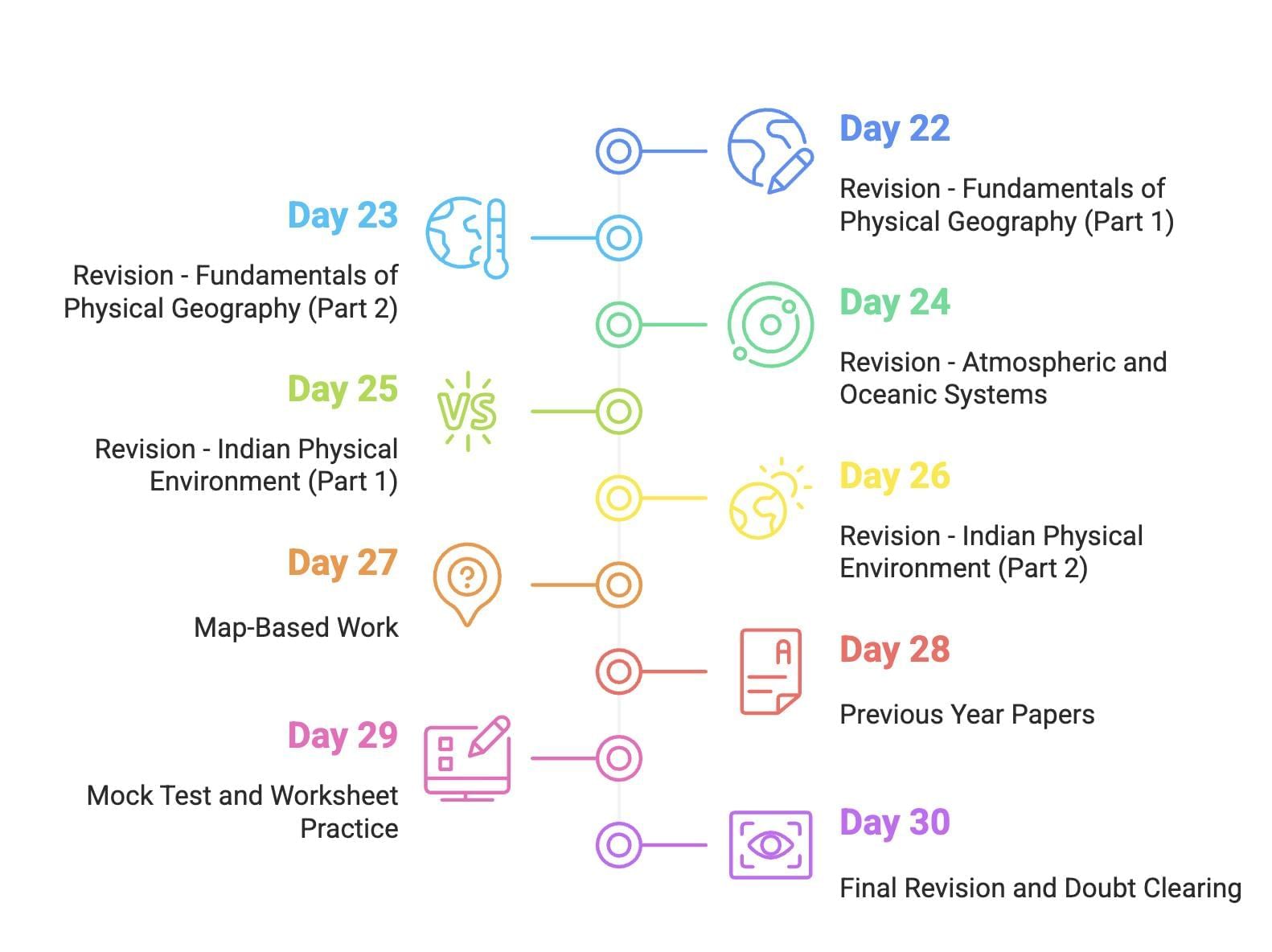
|
70 videos|289 docs|44 tests
|
FAQs on 30-Day Study Plan for Geography Class 11 - Geography Class 11 - Humanities/Arts
| 1. What are the key components of physical geography that students should focus on during their studies? |  |
| 2. How can I effectively prepare for my geography exam using the 30-day study plan? |  |
| 3. What advanced topics in physical geography should be included in the curriculum? |  |
| 4. Why is it important to study the Indian physical environment specifically? |  |
| 5. What strategies can I use for effective revision in the last week before the exam? |  |















